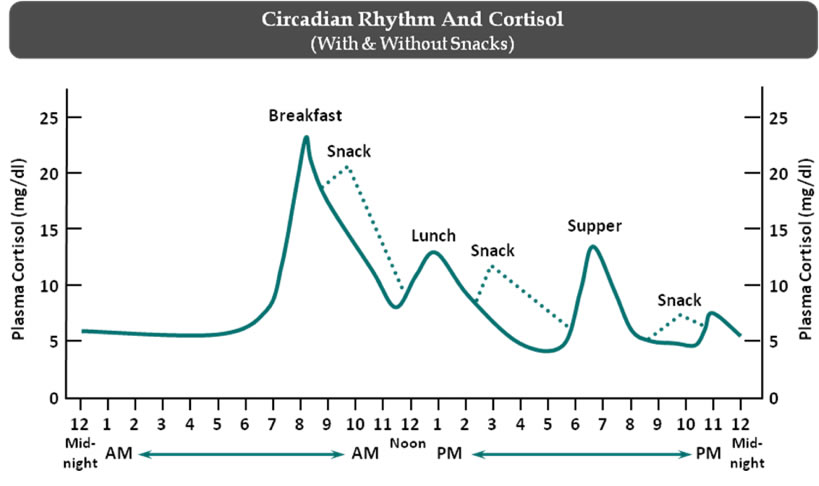For as long as I can remember I have been waking up utterly exhausted usually from nightmares and it takes me all day to get my energy back. Usually I feel best between 8pm and 2am. If the above graph reflected my exhaustion levels it would be pretty darn close! Duh!
The nightmares in the early morning hours make sense in that cortisol is a a stress hormone, and leads to nervous system activation. Cortisol is also catabolic leading to the breakdown of muscle tissue for energy. When you sleep your body is fasting. High cortisol also impairs your immune system and causes wounds to heal slower. Excessive cortisol also causes collagen loss from the skin and reduces bone formation. It also impairs learning and long term memory retrieval. Can’t remember your dreams? I usually have woken up muscles tight and stiff, adrenals depleted, emotionally exhausted, energy depleted and no appetite to boot and then not eating which by prolonging the stress response.
A lot of western breakfasts are high fat/fiber/protein such as eggs, bacon, cereal & milk. Oh and then a cup of cortisol boosting coffee. Perhaps westerners have got it all wrong and some insulin promoting carbs may be better, a potato or some rice perhaps. When I traveled to Japan I always had rice for breakfast.
I don’t want you to get the impression that cortisol is evil, it is naturally very good for you if your survival is threatened and your in danger and need to move quickly. However is this the case for most people between the hours of 4am and 8am??
Anthropological Evidence for polyphasic sleeping
There is also good ancestral evidence that humans for most of history only slept 4 consecutive hours at a time, breaking their sleep up into chunks. It is only with the recent age of industrialization where maximal daylight work hours were trying to get squeezed out of human laborers. As the BBC reports:
“In 2001, historian Roger Ekirch of Virginia Tech published a seminal paper, drawn from 16 years of research, revealing a wealth of historical evidence that humans used to sleep in two distinct chunks.
His book At Day’s Close: Night in Times Past, published four years later, unearths more than 500 references to a segmented sleeping pattern – in diaries, court records, medical books and literature, from Homer’s Odyssey to an anthropological account of modern tribes in Nigeria.
“It’s not just the number of references – it is the way they refer to it, as if it was common knowledge,” Ekirch says.Ekirch found that references to the first and second sleep started to disappear during the late 17th Century. This started among the urban upper classes in northern Europe and over the course of the next 200 years filtered down to the rest of Western society.
By the 1920s the idea of a first and second sleep had receded entirely from our social consciousness.“
People were becoming increasingly time-conscious and sensitive to efficiency, certainly before the 19th Century,” says Roger Ekirch. “But the industrial revolution intensified that attitude by leaps and bounds.”
Strong evidence of this shifting attitude is contained in a medical journal from 1829 which urged parents to force their children out of a pattern of first and second sleep.
“If no disease or accident there intervene, they will need no further repose than that obtained in their first sleep, which custom will have caused to terminate by itself just at the usual hour.
“And then, if they turn upon their ear to take a second nap, they will be taught to look upon it as an intemperance not at all redounding to their credit.”
……“For most of evolution we slept a certain way,” says sleep psychologist Gregg Jacobs. “Waking up during the night is part of normal human physiology.”
The idea that we must sleep in a consolidated block could be damaging, he says, if it makes people who wake up at night anxious, as this anxiety can itself prohibit sleeps and is likely to seep into waking life too.
Russell Foster, a professor of circadian [body clock] neuroscience at Oxford, shares this point of view.
“Many people wake up at night and panic,” he says. “I tell them that what they are experiencing is a throwback to the bi-modal sleep pattern.”
But the majority of doctors still fail to acknowledge that a consolidated eight-hour sleep may be unnatural.”
Over 30% of the medical problems that doctors are faced with stem directly or indirectly from sleep. But sleep has been ignored in medical training and there are very few centres where sleep is studied,” he says.
Jacobs suggests that the waking period between sleeps, when people were forced into periods of rest and relaxation, could have played an important part in the human capacity to regulate stress naturally.”
If you remember a while back I was interested in polyphasic sleeping where instead of sleeping in the modern human contrived 8 hour time increment it is perhaps more natural/ancestral to sleep in two 3-4hr segments separated by 8-12 hours. Many animals do this already naturally, but many humans have eschewed this.
Sleep occurs in phases, and people often awaken briefly during REM phase. The deepest most rejuvenating sleep occurs at stage 4 and two cycles complete after roughly the first 4 hours of sleep. The next 4 hours are not nearly as rejuvenating as the stages are not as deep, which lead to fragmented sleep naturally.
The theory is if you sleep only 4 hours, get up and sleep again 12-ish hours later, you can get another deep cycle in. Meaning in a 24hr time period you could perhaps get more deep delta sleep in if you split it up. The way to hypothetically get the best/most rest is to seemingly split up sleep into two 3.5-4 hour increments spaced 9-12hours apart.
When i first started taking resistant starch it seemed to me that it was coaxing my body more towards this polyphasic style of sleeping. The natural outcome would be that I would be eating every 4 hours instead of starving myself for 8 and inducing a massive cortisol spike. Thus it seems that a person following this kind of eat/sleep schedule can completely eliminate the huge early morning cortisol spike and all it’s associated negative aspects.
The modern “normal” eat/sleep schedule appears to thus be very detrimental to many if not perhaps most people. I mean who purposely wants to impair their immune system, slow healing and rejuvenation in the body, enhance catabolism right when you want to be doing the opposite? Sleep is supposed to be rejuvenating! The thing is if you do it too much at once, it has the opposite effect.
I suspect many people may be inducing adrenal fatigue by following the “normal” sleep/eat schedule.
The hormone connection
Cortisol is produced from Pregenolone the precursor to Progesterone.
“When the adrenals are stressed, the increased need for cortisol depletes the progesterone levels used in making cortisol. As more progesterone is shunted or sequestered to make cortisol, less is available to balance off the estrogen.” (reference)
This leads to Estrogen Dominance, increased fat storage, low libido, etc.
Low DHEA and testosterone levels are also a consequence of high cortisol demands as the precursors are depleted due to the primary survival demand of cortisol which takes hormonal priority in terms of production and utilization.
My point is stress avoidance & especially by adopting a polyphasic/sleep/eat schedule should cut down the need for cortisol and free up those hormone substrates to balance out estrogen dominance.
When you artificially take DHEA/progesterone you may just actually be feeding the cortisol beast. Why not stop the need for cortisol production in the first place!!!
Stress hormones/neurotransmitters do NOT self-down regulate, unlike dopamine and serotonin. Again for survival reasons. What this means is stress hormones can very easily establish a negative cycle, where stress begets more stress and then your hormones are all out of whack.
The genetic connection
The cortisol impact has a negative effect on certain genotypes more than others. Based on my personal nutrigenomic analysis I have a double mutation on the COMT gene. Practically this means I have a 3-4 fold reduced clearance of the neurotransmitters dopamine, epinepherine (adrenaline), and norepinephrine from neural synapses.
When cortisol levels rise epinepherine, and norepinephrine tend to rise in tandem. Due to the my COMT variation the stress effects will be more acute as well as last longer due to slower metabolism of said catecholamines from mys system. This can have a negative feedback cycle effect where stress begets more stress quickly leading to adrenal fatigue.
Someone who has a “normal” genotype on the COMT gene will be able to handle the stress of increased cortisol and epi/nor-epi much better due to faster metabolism of the latter two compounds. These folks naturally de-stress more quickly. Therefore this means that those people may not benefit to the same degree from polyphasic sleeping/eating than those with the double COMT mutation.
While a double COMT variation has the downside of poorer stress management it does have the upside of there being naturally higher levels of dopamine in the brain which is thought to increase intelligence. This is perhaps why so many great minds have benefited from the polyphasic sleep/eat schedule and why they naturally tend towards it.
The gut microbiome connection
Cortisol also has consequences on your micro-biome and can increase leaky-gut.
Now I know many people are probably quite adverse to changing the way they have been sleeping their entire life. I now, force myself to wake up after about 4-5 hours of sleeping and eat some carbs to boost insulin a bit to dampen cortisol. If I’m still tired I will go back to bed and nap, but at least it will be more rejuvenating this way.
It has been a “belief” that you need 6-8 hrs of consecutive sleep for proper rejuvenation. Many people thus will get anxiety if they think they are not getting what they are “supposed” to. Hopefully this post can change some of the psychology around this. And remember you can still get all the sleep you need, just tweak it so your cortisol doesn’t spike. Eat some carbs every 4 hours. Your body, mind and microbes will thank you.
Siesta anyone?
 Submitted by Dream Doctor on
Submitted by Dream Doctor on 

